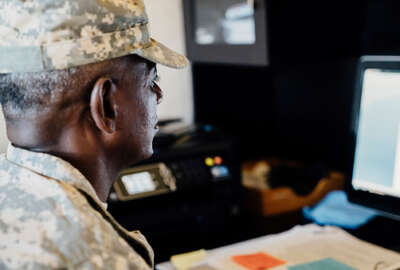
Services willing to bend rigid standards to grab more cyber talent
The military is changing its training and recruitment standards to fit cyber operators.
The military is desperate for service members who have or are willing to develop cyber skills and this week was another example of the ways the services are trying to scrape up new cyber troops.
The military services realize the traditional way of recruiting and training people just isn’t cutting it and they are starting to rethink their standards and incentives for cyber service members.
The most recent example comes from the Navy and the Air Force.
Navy Cyber Security Division Director Rear Adm. Danelle Barrett admitted it may be time for the service to change some of the barriers for entry when it comes to cyber sailors during a speech Monday at the AFCEA Navy IT Day in Arlington, Virginia.
“I want to take a look at, and we are starting to do these kind of things, if I want to have an offensive operator, I don’t necessarily need that guy to have a bachelor’s degree or that gal to have a bachelor’s degree or a degree at all” Barrett said. “I need them to think a certain way, think like an adversary, think sneaky, think devious, right? Maybe the best way is to bring the best gamers in. How do I get those guys in?”
Barrett said the Navy needs to look at what the service needs, and then what are legacy impediments keeping those people out of the service.
Barrett isn’t the first person to consider lowering some kind of restriction or standard on cyber troops to recruit or retain them.
Just last week, the Army told Congress it is considering lowering the amount of training it takes to become an interactive on-net operator (ION) or a tool developer.
“As we conduct more and more operations off of Title 10 infrastructure, what we recognize is not every ION has to be remote interactive operating training (RIOT) qualified,” said Lt. Gen. Stephen Fogarty, the commander of Army Cyber Command. “We have a Title 10 operators course that allows our IONs to actually operate off the Title 10 infrastructure. That gives us the opportunity to observe them as they start to act, conduct reps. Then we can identify better those star athletes that we need to send to RIOT.”
Fogarty said the Army hopes to pick someone with a higher aptitude and a better likelihood of graduating RIOT.
“That would eventually double our numbers if we can get that straight,” he said. “By getting them in the Title 10 operators course we get them on mission much sooner than if we send them through RIOT training.”
Meanwhile, the Air Force is taking a more traditional approach to retaining its cyber airmen. The service released new selective retention bonuses, which increased to a maximum of $100,000 from $90,000 last year.
What’s one of the specialties eligible for that $100,000 bonus? You guessed it: cyber warfare operators.
The maximum bonus is also available for other areas the Air Force is hurting, particularly in maintainers and flight experts.
The Air Force also considered investing in gamers and plans to use video games to find some of the recruits it needs.
The idea is to create video games sponsored by the Air Force and let people play them. From there the Air Force can monitor what IP addresses are doing particularly well and offer them incentives to join the military.
“That game gives me insight into their skill, their knowledge, their attributes and their characteristics. I don’t need to know their names, but I know that IP address so-and-so really has unique skills to be a helicopter pilot,” Lt. Gen. Steve Kwast, the Air Education and Training Command chief, said in May.
The changes and considerations go to show how much the military is willing to bend its rigidity to operate in the developing cyber domain.
Read more of the DoD Personnel Notebook.
Copyright © 2024 Federal News Network. All rights reserved. This website is not intended for users located within the European Economic Area.
Scott Maucione is a defense reporter for Federal News Network and reports on human capital, workforce and the Defense Department at-large.
Follow @smaucioneWFED




